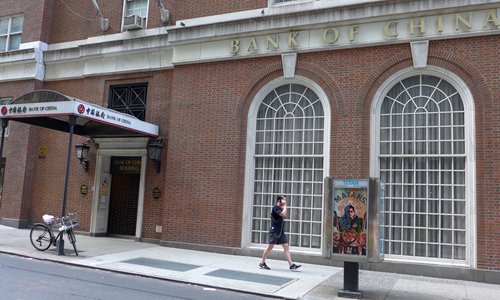Chinese business group blasts US protectionism
Restrictions hit FDI, hurt jobs and consumers: survey

A passenger walks past a Bank of China branch in New York. File photo: VCG
A leading Chinese business group in the US has blasted the US administration's protectionist actions and lack of policy transparency toward Chinese companies, which it said has led to a drastic decline in Chinese foreign direct investment (FDI) in the country and put US jobs and consumers at risk.
Under an increasingly hostile stance from the US toward China, Chinese companies have met with more challenges in a wide range of areas, from US tariffs to visa applications to higher compliance costs, according to a recent survey from the China General Chamber of Commerce - USA (CGCC).
Chinese FDI in the US is down nearly 90 percent so far this year from its peak in 2016, due to restrictive measures from both the US and China, according to the CGCC's 2019 Annual Business Survey Report, which was shared with the Global Times on Tuesday.
Business deals worth billions of dollars have been blocked by the opaque Committee on Foreign Investment in the US (CFIUS), which reviews transactions on national security grounds, and many companies held back on acquisitions after the Chinese government issued guidance restricting investments in certain foreign assets, the survey of executives from 240 Chinese companies in the US noted.
However, a structural shift in the US strategy toward China has resulted in "a protracted trade war that has penalized companies, consumers and people from both countries - and all around the world," it said.
CGCC member companies have invested more than $120 billion in the US, directly employ more than 200,000 people, and indirectly support more than 1 million US jobs, according to Chen Xu, chairman of the CGCC and president and CEO of Bank of China's US branch.
But "this environment's uncertainty shakes our members' confidence and discourages them from making further investments in the US," Chen wrote in the survey.
Unfriendly environment
The US government has labeled China a "strategic competitor" and waged a trade and tariff war with China, slapping tariffs on hundreds of billions of dollars worth of Chinese goods and cracking down on Chinese companies. Secretive reviews by the CFIUS have also blocked several high-profile deals involving Chinese companies and created a chilling effect for future deals.
The sensitive nature of conducting business in the US in such a less-welcoming climate is also palpable in Chinese companies' willingness to speak about their operations in the country. Several major Chinese companies declined requests from the Global Times for comments on their plans in the US.
But in the survey, 52 percent of respondents said that the business environment in the US have deteriorated in 2018, more double the 23 percent that gave this response in 2017, while 6 percent said the environment declined "substantially."
Apart from the US tariffs, Chinese companies also reported a long list of challenges, including restrictions on employment-based visas, escalating US protectionism, high compliance risks, slowing growth of the US economy and unstable US policies toward foreign investment.
KC Pang, a vice president of human resources at GD Copper, said that the company has seen "significant increases" in visa applications of Chinese technical experts being held up for "a lengthy period of time or denied."
"Without technical experts from China, we are not able to train local employees, so the business cannot be sustainable. This is our biggest challenge," Pang said.
The firm, which specializes in copper tubes, recently announced a plan to invest $3.5 million in its $100 million plant in the state of Alabama, where it employs more than 300 people.
Xiao Yuqiang, chairman of the Industrial and Commercial Bank of China (ICBC)'s US Management Committee, said that Chinese major banks are under "regulatory scrutiny in the US" and ICBC faces "much higher" compliance costs than big US banks.
A vast majority of Chinese companies, 73 percent, also felt that the CFIUS process was politicized and opaque, the survey stated. "CFIUS reviews have been routine since the mid-1970s; however, the current administration has added a new level of scrutiny and political gamesmanship to them."
Bai Ming, a deputy director of the Ministry of Commerce's International Market Research Institute, said that the report further demonstrates how the US adopts double standards in its policy.
"On the one hand, the US is criticizing China's lack of transparency for US companies; on the other hand, it has been even less transparent in its treatment of Chinese firms," he told the Global Times on Tuesday, "I don't think such a tactic will bode well for anybody."